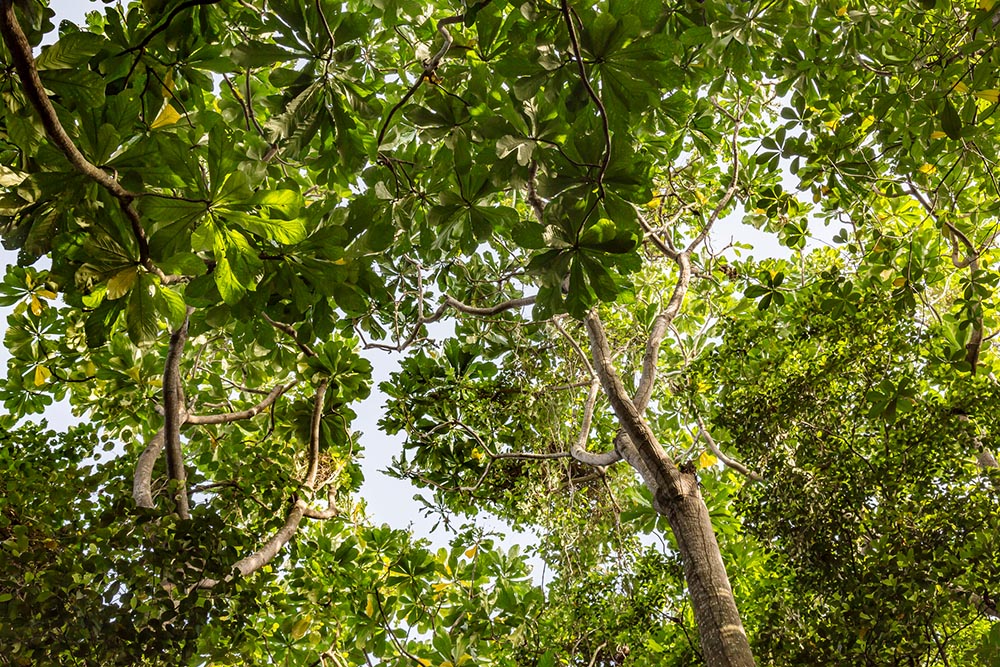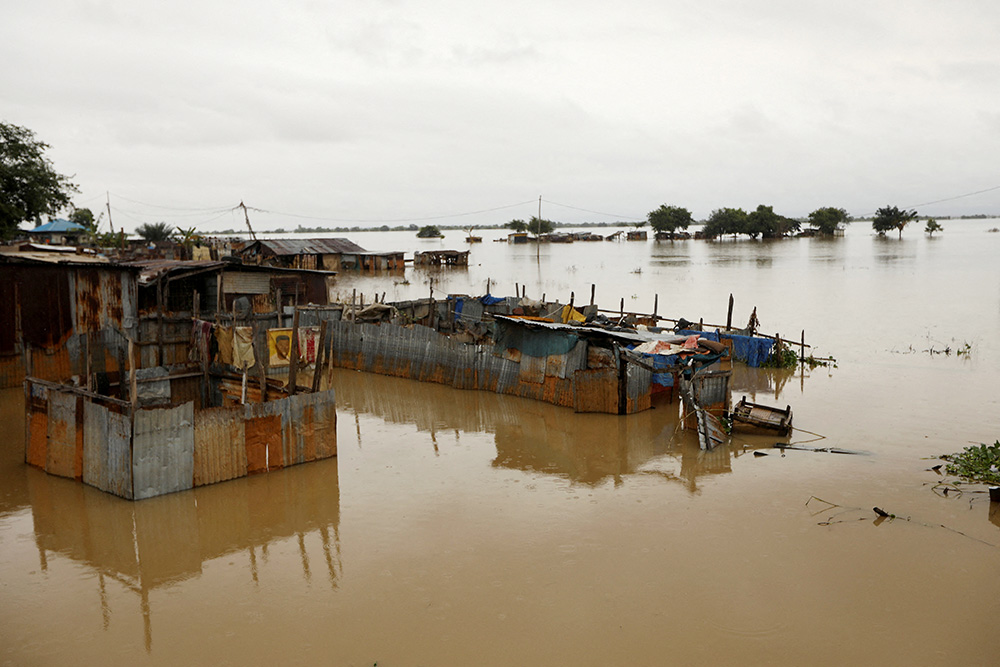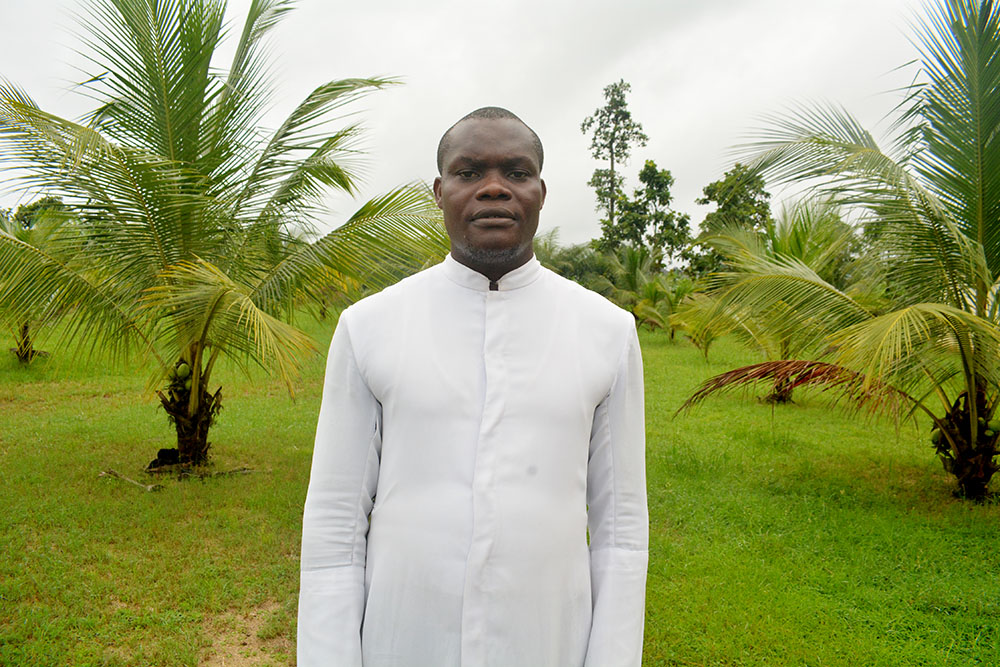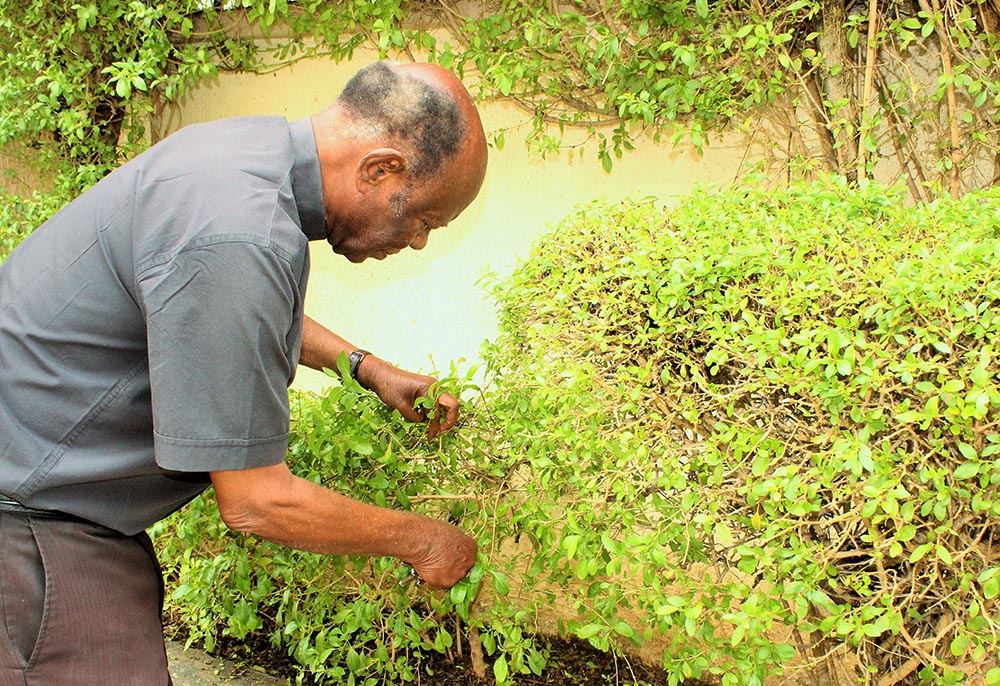
A canopy of mangrove trees is seen at the Lekki Conservation Centre in Lagos, Nigeria. Mangrove is among the tree varieties being seeded and planted on Catholic Church properties as part of a new church campaign that aims to plant 5.5 million trees over the next five years to prevent flooding and mitigate climate change. (Dreamstime/Matthew Omojola)
After work every evening, Alfred Dodo saunters into his backyard where he waters his moringa seedlings — it is a routine he never misses. He planted about 1,000 seedlings in compost he prepared, but only about 340 sprouted in July.
Dodo took the germinated seeds to his church — St. Philip's Catholic Church in Bakin-Iku, Niger State, in the North Central region of Nigeria — where parishioners from several churches collected them for planting.
For him, it's more than a mere tree-planting exercise. It's an ecosystem-based solution to protecting the environment from flooding and extreme weather conditions.
"I feel excited about this exercise and can call myself an environmentalist. Because of my contribution in mitigating the effect of climate change, and I like the fact that we are planting moringa trees because they help to filter the air that we breathe," Dodo said. "The impact of climate change is enormous, and if people would key into this project of tree planting, it will reduce the amount of carbon that is in the environment."
'I feel excited about this exercise and can call myself an environmentalist.'
—Alfred Dodo
Nearly 16 million people in the country are currently exposed to severe flooding that has destroyed homes and farmlands, especially in communities along the floodplains of the two major rivers: Niger and Benue.
Dodo, 32, was trained in moringa seeding and caretaking by the Justice Development and Peace Commission (JDPC) of the Minna Diocese in Niger State. He describes his work as an effort "to protect my community from floods and storms."
Heavy rain and rising waters have continued to threaten to sink cities or slowly drag them into the ocean in countries around the world. It's a global problem that accounts for about 47% of all global weather-related disasters. More than 1.47 billion people face flood risk worldwide every year.
While countries in Europe, America and Asia have legally committed to reach net zero emissions by 2070, Africa has contributed very little to climate-warming greenhouse gas emissions, and its residents are among the most vulnerable to its expanding collateral damage.
Nigeria, the continent's most populous nation, is particularly vulnerable to the effects of climate change, and will take the biggest hit as data shows that climate change could reduce gross domestic product per capita by about 15% by 2050 in countries across East and West Africa.

Houses are seen submerged in floodwaters in Lokoja, Nigeria, Oct.13, 2022. (CNS/Reuters/Afolabi Sotunde)
Nigeria experienced its worst flooding in a decade in 2022. High water caused problems in 34 of the country's 36 states, leaving more than 600 people dead, with more than 1.4 million people affected and thousands displaced or injured.
Also, more than 100,000 hectares (about 250,000 acres) of farms were submerged by water, with estimated total direct economic damages worth about $9.12 billion, according to the Global Rapid (Post Disaster) Damage Estimation (GRADE) Assessment Report of the 2022 flood.
Factors responsible for Nigeria's recurrent flooding include a lack of institutional coordination and early warning systems, unusual rainfall, overflowing rivers, release of water from Lagdo Dam, poor waste management and settlements on flood plains.
Alaba Gbadamosi, professor of silviculture and biotechnology at the Adekunle Ajasin University in Ondo State, says trees could stand as a nature-based solution for coastal flood protection "because the roots serve as a barrier that hold soil particles together and prevent them from being washed away by floods."
"But unpredictability of the weather condition and unusual rise in sea level could worsen the problem of flooding in Nigeria if adequate measures are not taken."
In Bomadi, a diocese in Nigeria's oil-rich Bayelsa State, 37 of 53 parishes suffered severe flooding that displaced many, including priests and nuns. Some displaced persons sheltered at the residence of Bomadi Bishop Hyacinth Egbebo.

Fr. Zachariah Fufeyin, director of the Justice Development and Peace Commission in the Bomadi Diocese, poses for a photo in the bishop’s court in Bomadi, in Nigeria’s oil-rich Bayelsa State. (EarthBeat photo/Valentine Benjamin)
Fr. Zachariah Fufeyin, director of the Bomadi Diocese's Justice Development and Peace Commission, said the Niger Delta has always been in serious trouble with incessant flooding.
"We're surrounded by water, which pushes us to the edge of perennial flooding. Poor management of the dams and disregard for early warnings and building of houses on water channels have also exacerbated these problems," he said.
Catholic institutions and parishioners in Nigeria are working to prevent future floods. The Catholic Bishops' Conference of Nigeria, which represents 58 dioceses in all 36 states of the country, launched during its first plenary on Feb. 15 this year a national Catholic tree-planting campaign that aims to plant 5.5 million trees over the next five years to mitigate climate change.
The tree-planting campaign was announced in partnership with Caritas Nigeria in Abuja, Nigeria's capital city.
The timing of the plenary was influenced by Nigeria's general elections, which were held Feb. 25 and March 11, due to uncertainties that surrounded the electioneering period.
Both Caritas Nigeria and the Abuja Archdiocese are spearheading the tree-planting campaign, while the Justice Development and Peace Commission through its offices across Nigeria's 36 states is getting the messages out to parishioners and the public.
Fr. Solomon Uku, director of the Justice Development and Peace Commission in the Abuja Archdiocese, told EarthBeat that the essence of the trees being planted is for them to stand and to help in mitigating any adverse effects in the ecology of the place.
"We will begin with planting within the church properties and depending on the assessment of those who are involved, it would be extended to the streets and the other arenas and places that might need those trees," he said.
Advertisement
They are planting native trees like moringa, gmelina, avocado, cashew, coconut, guava and mangrove trees on church premises, on farmlands and at schools where students from different backgrounds are encouraged to replicate the project in their homes when they return for holidays.
Tree planters at parishes ensure proper maintenance and growth.
Emmanuel Okechukwu, head of the environment unit of Caritas Nigeria, said the goal is for each diocese to plant 20,000 trees per year for the next five years.
"Caritas Nigeria's environment unit is mandated to spearhead this tree-planting campaign at the national level. We are doing advocacy, training, and developing a guideline that everybody can use according to their pace and capabilities," he said.
Caritas will celebrate its 13th anniversary on Sept. 20, and staff in nine of its state offices have been primed to plant trees on behalf of the organization on that day.
'Some of these parishioners don't know that seedlings of some of these trees we are talking about can be found around them.'
—Fr. Zachariah Fufeyin
Okechukwu said it's an inclusive program that involves the church and society entities.
"Trees are important in absorbing carbon emissions because they take in carbon dioxide and produce oxygen. They serve as windbreakers and help to control erosion and also contribute to food security. So, we're leaving no one behind," he said.
"The JDPC, ministry of health, ministry of education, schools, hospitals, family, and human rights commission are billed to participate in the tree-planting project, and with time, it's going to be all the departments of the Catholic Church in Nigeria. All the parishes over time will have to be part of it," he continued.
Msgr. Kenneth Enang, chairman of the Abuja Archdiocese's Education Commission, said the church is concerned about people, the environment and nature due to the threatening prospects of climate change across Nigeria.
"Climate change has caused so much harm across the world, depriving us of our livelihoods and our way of living with loss of properties costing millions of naira annually. So, when the encyclical letters of the pope were released, we had to launch the tree planting with the encyclical letter," he said.

Msgr. Kenneth Enang, chairman of the Education Commission for the Archdiocese of Abuja, Nigeria, tends to flower plants in his garden. (EarthBeat photo/Valentine Benjamin)
"We organized a 2-day seminar that was attended by well-meaning individuals, members of the Ministry of Environment, including the Ministry of Agriculture, and after that, we launched the tree-planting project across over 80 parishes under the Abuja Catholic Archdiocese."
"We planted about 3 million trees, and they have started to grow to check erosion, to protect the mother Earth and the good nature given to us by God," Enang told EarthBeat.
Dodo is now making plans to grow another set of seedlings from another commercial tree — avocado. The seeds will be ready for planting in the first week of September.
In Bomadi, the Justice Development and Peace Commission is working with the bishops to make provisions for the seedlings. Fufeyin says the commission will go from one parish to another to engage the parish priests and speak to the parishioners, including the Catholic Men Organization, the Catholic Women Organization, and the Catholic Youth Organization of Nigeria.
"We're addressing a huge population. Some of these parishioners don't know that seedlings of some of these trees we are talking about can be found around them," he said. "We will engage and sensitize them on why we should plant trees and with this sensitization, parishioners will begin to see the importance of tree planting."





